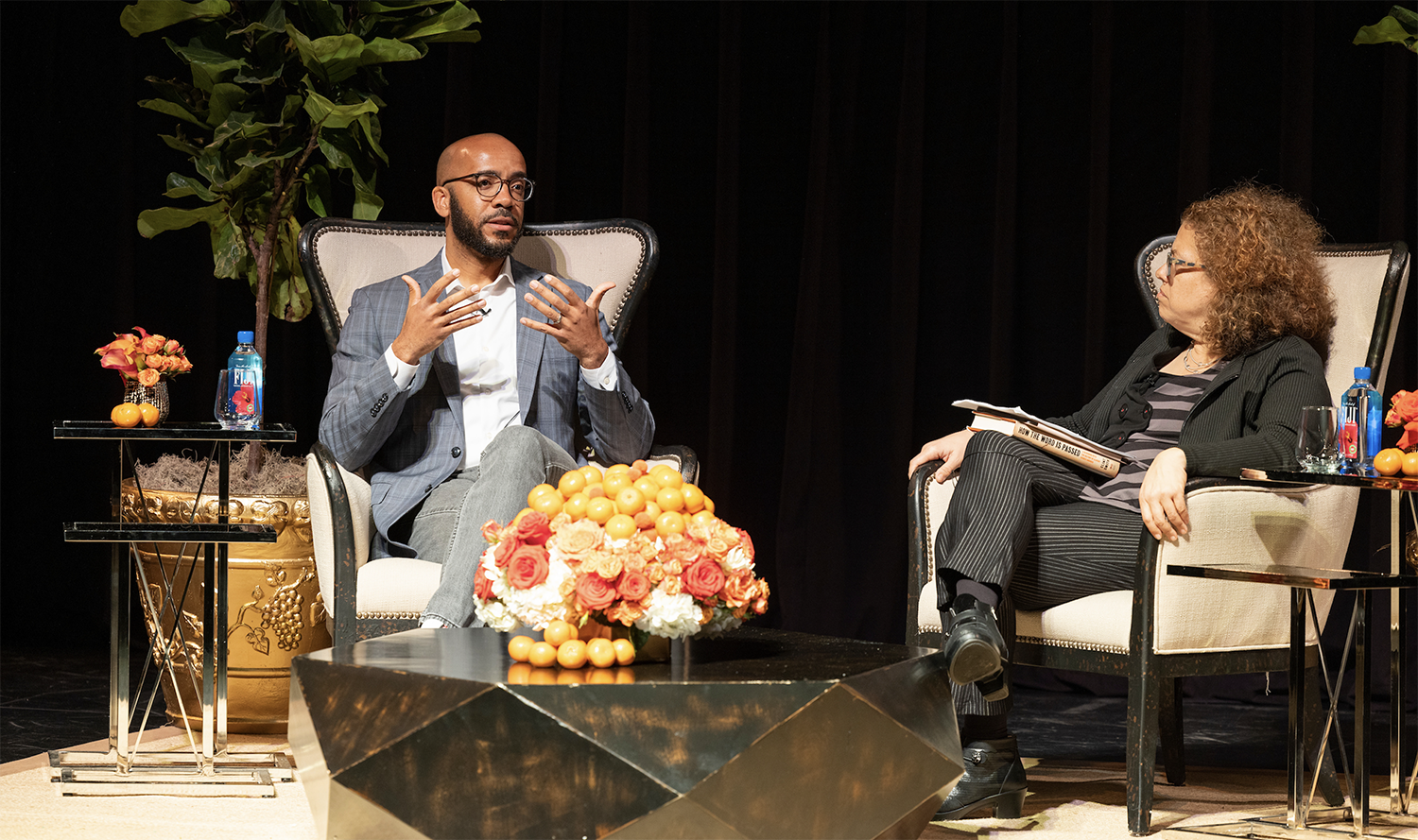
Clint Smith and Mia Bay
By Michele W. Berger
Photos by Lisa J. Godfrey
Original text in full at OMNIA
When Clint Smith was writing his bestselling book How the Word is Passed, he met a man named Norris Henderson. Henderson had spent nearly three decades incarcerated at the Louisiana State Penitentiary at Angola, the largest maximum-security prison in the country, built on the site of a former plantation.
Twenty years after his release, Henderson joined Smith on a bus tour of the facility. They saw prisoners in the distance working in the fields; a man on horseback, rifle over his shoulder, kept watch to ensure no one stepped out of line. That scene prompted Henderson to examine his own hands—calloused from the years he’d spent doing that very work—then share with Smith the incredulity he felt at being forced to pick crops on the same land where his enslaved ancestors likely did two centuries ago.
After a moving discussion with Penn’s Mia Bay (right), Clint Smith answered questions from the audience, sharing insights like the fact that his most recently written poem tends to be his favorite and that he writes whenever and where ever he can.
Smith shared many such stories in the Annenberg Center’s Zellerbach Theatre on that late-April afternoon. Mia Bay, Roy F. and Jeannette P. Nichols Professor of American History, joined him in a conversation that spanned Smith’s poetry, his work as an educator, his opinions on how the past should and can shape the future, and more.
Bay started the discussion by asking Smith about his writing journey, which began somewhere around the third grade, spurred by a compliment Smith’s teacher gave him about a poem he had penned. “It instilled within me a sense of possibility,” he said.
He recounted a summer internship during college that opened his eyes to the power of poetry, a newfound passion he brought back to Davidson College; the public health work he did in South Africa after he graduated college; the high school teaching job he next took in Washington, D.C., where he also joined Beltway Poetry Slam; and his doctoral research on incarceration.
At each turn, as he moved from essay writing to narrative writing to journalism, he kept in mind the poetry he so loved, incorporating its sensibilities by experimenting in many genres, “which I think is part of the Black literary tradition,” he explained. This brought out his knack for looking beyond the always-told history, instead seeking new or enlightened perspectives to share.
Bay asked him about this in the context of his work studying what education means to people sentenced to life terms as juveniles. She also asked how that research has shaped Smith’s perspective on history in the United States and whether understanding the past might help “in the now,” a question she often thinks about herself as a historian. “Does it prevent anything?” she asked. “Is there a moral to this?”
“Studying history doesn’t make you a better person,” Smith responded. “It can but I don’t think it’s a natural byproduct.” Someone having a personal connection to the history or learning of it through stories passed down from previous generations can complicate that further, he added.
To drive home the point, Smith relayed a story about a man named Jeff he’d met at a Confederate cemetery in Virginia. As a child, Jeff had visited that cemetery with his grandfather, who told him tales of the people buried there, had explained to him that slavery wasn’t the crux of the Civil War. Those moments represented fond memories for Jeff, who today repeats that tradition with his granddaughter. Asking Jeff to change his perception, Smith continued, would mean asking him to admit he’d been lied to by his grandfather. “It’s like a crisis of identity,” Smith said.
The 2023 Dean’s Scholars, 20 students from the College of Arts & Sciences, the College of Liberal & Professional Studies, and the Graduate Division, here with College Dean Paul Sniegowski (center).
But, as Smith told Bay and the audience in Zellerbach that day, he has such conversations with people like Jeff to grasp how they can genuinely believe something that undeniable evidence proves isn’t true. Smith said he thinks this country is grappling with critical race theory and similar issues today because of such disparate renderings of the same past.
Near the conversation’s end, Smith recited “All at Once,” the first poem in his new book Above Ground, which is focused on fatherhood and becoming a parent. Then Bay asked a few audience questions—which of his poems is his favorite (the most recent one he’s written), which daily habits inform his writing (doing it wherever and whenever possible, even in short bursts)—before closing out the event by asking Smith what’s next.
After a piece he did for The Atlantic, “How Germany Remembers the Holocaust,” Smith became interested in finding the untold stories of World War II, unearthing parts of that history that may deserve another look. Through the process, Smith will undoubtedly uplift people like Norris Henderson and delve into complicated characters like Jeff from the Confederate cemetery, part of “reckoning with the history” through his poetry and prose.
The Stephen A. Levin Family Dean’s Forum is an annual celebration of the arts and sciences. Initiated in 1984, the Forum presents leading intellectual figures who exemplify the richness of the liberal arts. It also recognizes outstanding undergraduate and graduate students for their academic achievement and intellectual promise. The forum is made possible by a generous gift from Stephen A. Levin, C’67, in honor of his sons Eric T. Levin, C’92, and Andrew Levin, C’14.
Previous guests have included Jon M. Chu, director of Crazy Rich Asians; David Epstein, bestselling author and expert on the science of high performance; and Marjane Satrapi, bestselling artist/illustrator, filmmaker, and author; among many others.
